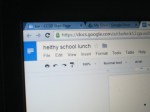 We’ve been having so much fun participating in #GeniusCon. Haven’t heard of #GeniusCon? Visit this archived webinar to learn more and read the post about our first steps.
We’ve been having so much fun participating in #GeniusCon. Haven’t heard of #GeniusCon? Visit this archived webinar to learn more and read the post about our first steps.
After students left the library for our kickoff session, they spent time in class reflecting on our chalk talk, writing in their notebooks, and fine tuning their topics. Today, they came to the library with their topics ready to work on question development.
We started with an overview of what happened since our last session. I shared tweets from Sherry Gick, Matthew Winner, Peter Reynolds, and more. I also told them how their work had been featured in the #GeniusCon webinar. Their eyes lit up knowing that their work was already making a difference!
I framed our session for the day by talking about how questions help us think about what we need to know about our topics in order to focus our research. We did a practice session asking questions about a topic that I could do for #Geniuscon: Teaching all of my lessons from home. At the moment, I’m not really doing this topic, but I wanted to choose something that might raise some eyebrows, and it really did! Students began asking questions about my topic, but as we progressed they started to ask questions like “how would you feel if you didn’t see us anymore?” and “what if we needed help with something in the library?” and “Wouldn’t you miss being here?”. This topic did exactly what I wanted because it allowed us to have a conversation about our chosen topics. I told them that it wasn’t our jobs to tell one another that our topics aren’t possible, that they’re wrong, or that we need to pick a different topic. Our job is to push one another’s thinking through questions and to support one another even if it means we disagree with topic choice or we feel personally that a topic is “impossible”.
We spent a bit more time brainstorming questions for my topic with partners. Here are a few questions that they came up with:
-
What lessons should I teach?
-
Do I know anyone that will be interested in learning from home?
-
How will I do it?
-
How many students will I have?
-
How many lessons from home can I teach?
-
What happens if someone needs help checking out and I’m not here?
-
Why would I want to do this?
-
How would people know how to connect with me?
- What if the Internet doesn’t work?
Next, students logged into their Google Drive and created a document with their topic listed at the top. Then, they started a bullet list and began adding their own questions. After all students were set with their doc ready, we began passing the laptops around the circle and asking one another questions. Students looked at the topic at the top and read the question already generated. Then, they thought of what questions they would add to the list for the researcher to consider. I’ll admit that this part was difficult. Even with our lively opening, students had a hard time generating questions. Several adults had individual conversations with students to support their question development. These conversations were critical. At different times we had me (the media specialist), the classroom teacher, a gifted teacher, a tech integration specialist, and and early intervention teacher supporting students. Here are a few topics with the questions generated.
Taking Tablets Home:
-
can we for a week?
-
or for month?
-
what happens if you break it?
-
What do students do if they don’t know how to use it?
-
what happen’s if somone needes one at school and you forget it at home?
-
how long?
- what if people don’t have internet at home?
More Playground Equipment:
-
what equipment should we get?
-
how much equipment?
-
what kind?
-
what if there’s not enough space?
-
isn’t it expensive?
-
why do you wont to change the playground?
-
will we be kind on it?
-
is the play ground equipment safe?
-
who would pay for it?
At our closing, students got their own computers back, read their questions, and shared their documents with me. I told them that it was ok if they didn’t understand a question or if they even disagreed with a question. We closed by once again asking “Why are we asking questions and not jumping into answers?” We framed the idea of thinking about what we need to research. Next, we will spend some time developing a research plan. We’ll brainstorm where we need to look for answers and begin our search for answers.









I am so excited to get to work with Barrow kids on this project. I just wish I had introduced my own Genius Hour project to my students this way. We might have to flip the tables and get the Barrow Kids to help the UGA kids 🙂
They would be glad to share their process. I can’t wait for your students to meet these kids.
[…] Then, they chose topics and spent time developing questions around those topics. […]
[…] Then, we worked on selecting topics and developing questions. […]